Rezoning request approved for Ford's Blue Oval Battery Park Michigan. So what's next?
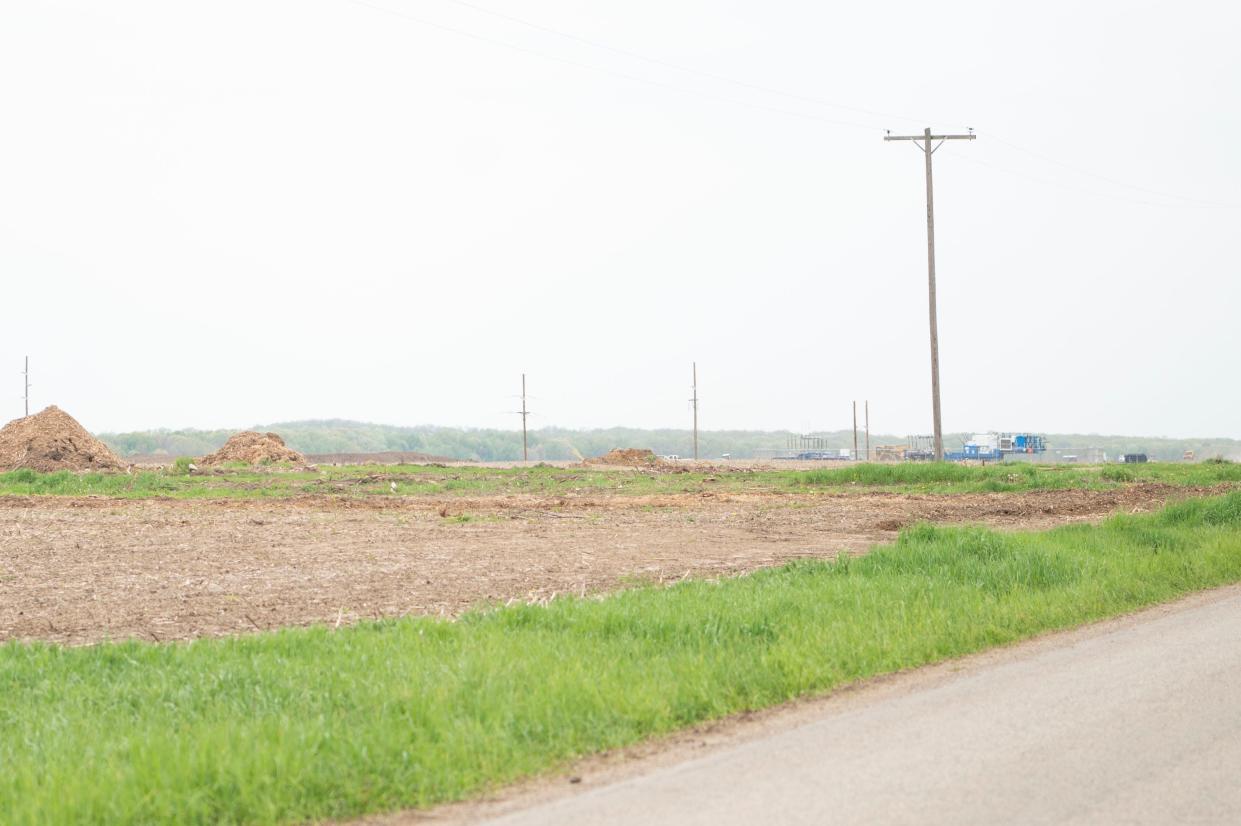
MARSHALL — Plans to build an electric vehicle battery factory in Marshall Township are continuing to take shape.
Ford Motor Company in February announced its intention to build the nearly 2.5 million square foot EV battery plant on a portion of the Marshall Megasite, a roughly 2,000-acre parcel southwest of the I-94/I-69 interchange that's been considered for decades as a potential destination for a large-scale manufacturing operation.
These days, the site is a flurry of activity as crews work to level the land in preparation for development. Ford plans to invest $3.5 billion to make the EV battery plant a reality, an investment that's expected to create 2,500 jobs when production of lithium iron phosphate batteries begins at the plant in 2026.
The project cleared a major hurdle last week as a request to rezone 741-acres of the Megasite to Industrial and Manufacturing (I-3) Zoning was unanimously approved by the Marshall City Council.
That vote, however, came after five hours of public comment in which many residents urged the council to vote against the rezoning, citing concerns about the potential for pollution at the site, the loss of several historic farmsteads and the loss of quality agricultural land, among other issues.
So, where does the project stand?
Ford still needs site plan approval and building permits to construct the battery plant. The automaker has submitted its initial site plan and Marshall city staff are expected to review the document May 19.
"Our job is to make sure the site meets the ordinance, meets statutes (and) protects the community," Marshall Director of Community Services Eric Zuzga explained.
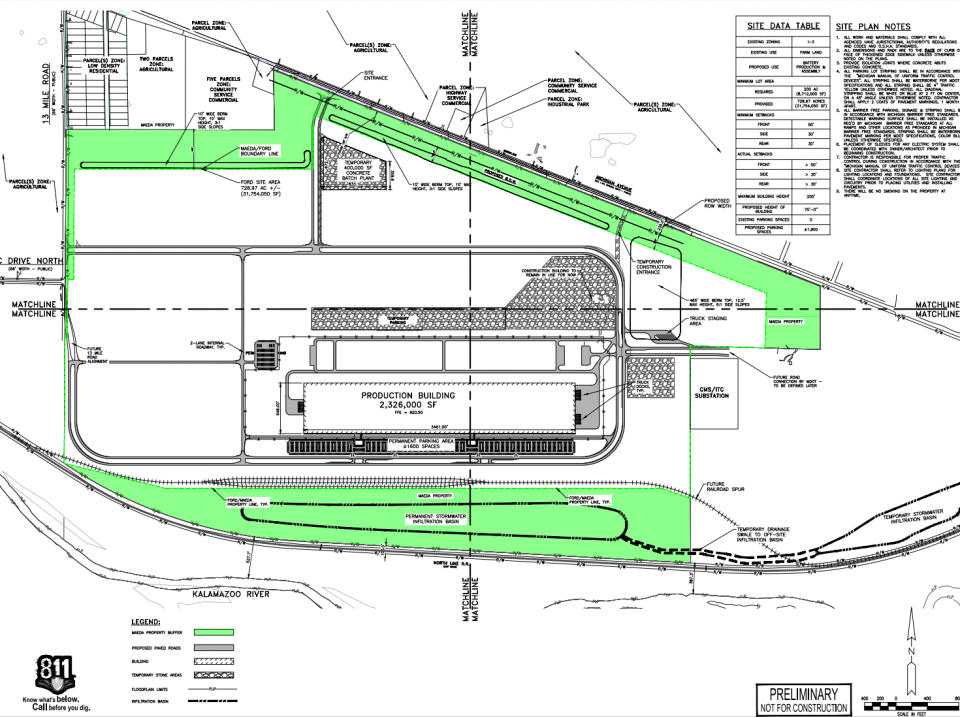
The site plan does not require planning commission or city council approval. Rather, Zuzga and a development review team comprised of 12-14 city employees and consultants will review the plan to determine if it meets all necessary standards.
The site plan can be approved with or without conditions, or the city could ask Ford to make adjustments and submit a new plan, according to Zuzga.
"We’ve been going through reviews internally on the site plan, having discussions with the Ford team (already)," Zuzga said. "Ford has been a great partner and they want to do the right thing. ... They understand the issues, they understand what the site is."
How Marshall landed the Ford project
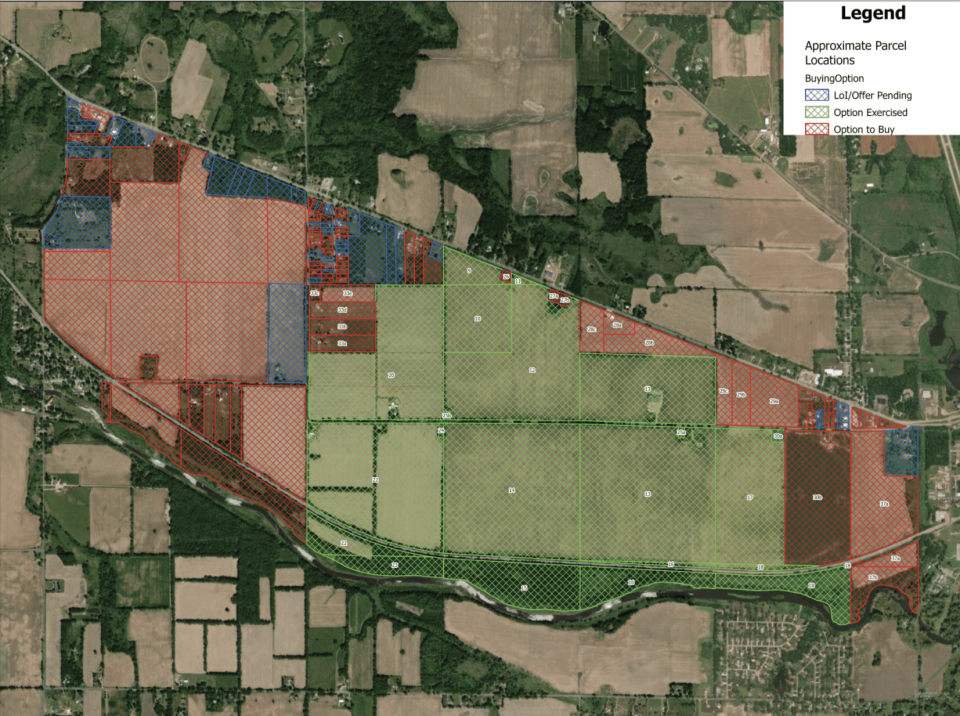
The Marshall Megasite runs approximately 3.3 miles west to east and 1.5 miles north to south, extending from 12 Mile Road to the east to slightly past 15 Mile Road, and from Michigan Avenue to the north down to the Kalamazoo River.
At least a portion of the site has been zoned industrial dating back to the 1960s, according to James Durian, CEO of the Marshall Area Economic Development Alliance. Over the past two decades, several major companies — Volkswagen and Toyota among them — considered the site, but ultimately decided to build elsewhere.
"It just wasn’t site ready," Durian said. "Part of it was zoned industrial but it didn’t have infrastructure to the site. It wasn’t as build-ready as the companies wanted."
Momentum for developing the Megasite began to build considerably in 2021 after Ford and joint-venture partner SK On announced an $11.4 million investment to build EV assembly and battery plants at sites in Tennessee and Kentucky.
"That was the real turning point," MAEDA legal counsel Richard Lindsey, who sent out letters to area property owners to secure option agreements to purchase properties to expand the Megasite, explained. "As we acquired (additional acreage) and got closer to that 2,000-acre number, all of the sudden we had projects from all over the world that were interested."
Ford came to the table last October as it considered sites to house its planned $3.5 billion EV battery plant. Michigan secured the project after Virginia Gov. Glenn Youngkin in January said he pulled his state from the running due to the involvement of Chinese battery maker Contemporary Amperex Technology Co.
A wholly-owned Ford subsidiary will own the Marshall plant and manufacture the battery cells using LFP battery cell technology licensed from CATL. Ford plans to build the plant, dubbed BlueOval Battery Park Michigan, on 950 acres of the Megasite.
"I didn’t think this would ever happen back in October because it just seemed like there was too much that needed to be done," Durian said. "We kept hitting all the metrics and I thought well, we seem to be in pretty good shape. ... But I didn't know for sure until they made the announcement."
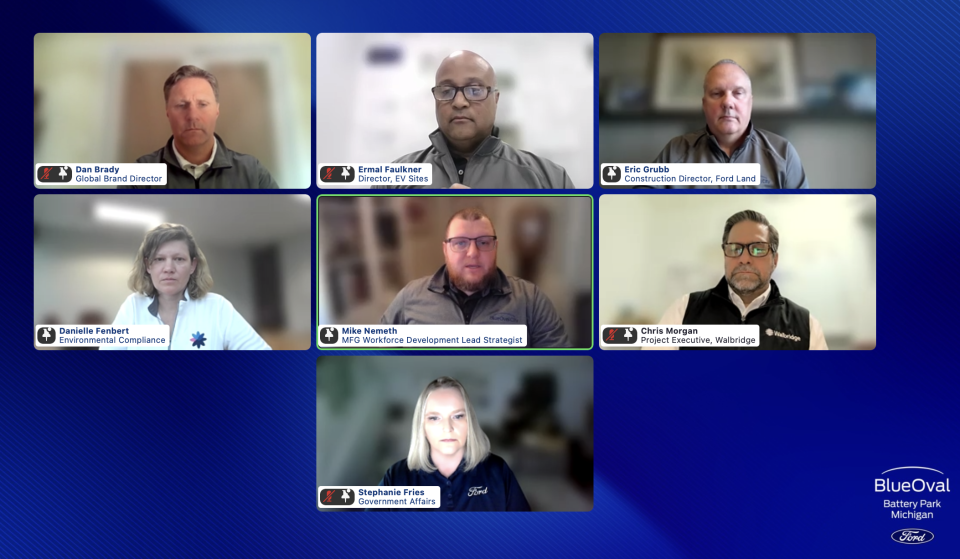
Ermal Faulkner, director of EV sites at Ford, said the automaker conducted a very thorough site selection process before landing on Marshall.
"We considered sites within the various states as well as internationally to try to understand where best to put this," Faulkner said. "When we looked at all of the factors, we felt that the Marshall site really offered everything that we were looking for and was really prepared for something of this scale."
Residents voice concerns, push back against development
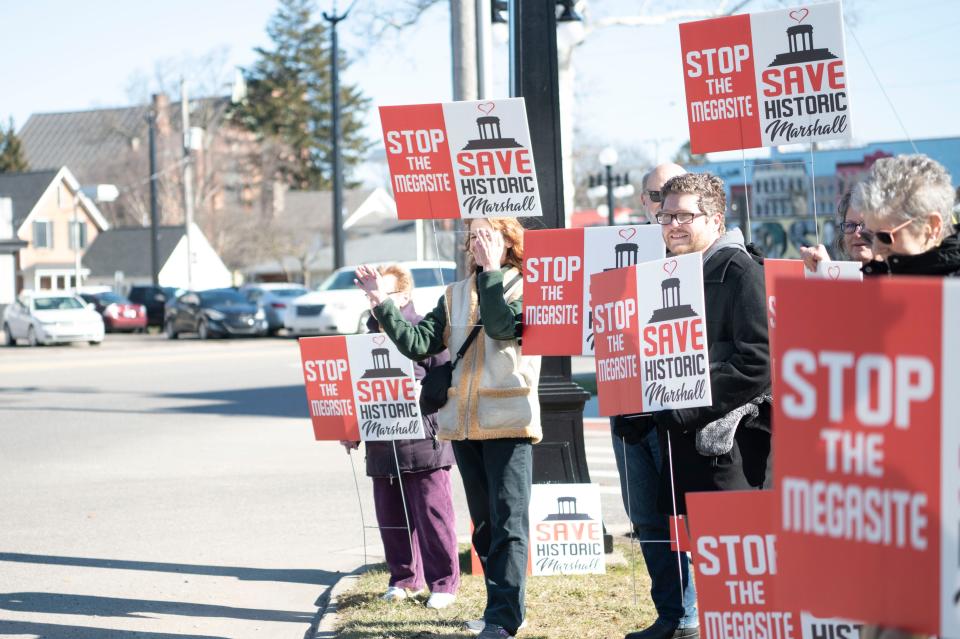
While some residents feel the investment and jobs are needed to move Marshall forward, others are concerned about the potential for pollution at the site, the loss of quality agricultural land and the involvement of Chinese battery maker CATL as it relates to national security.
A portion of residents also feel the project fails to align with the small-town charm of Marshall.
Marshall Township resident Victoria McGuffin, a chemistry professor at Michigan State University, worries about the future of the Kalamazoo River if this development ultimately comes to fruition.
"It is an environmental risk to situate a manufacturing plant directly adjacent to the river. It’s also environmentally irresponsible," McGuffin told the Marshall Township Board of Trustees during an April 17 meeting.
McGuffin is not against building a battery plant, but "I object to you building it here, on this river," she said. "I would gladly support it on any other property that’s appropriate within Marshall Township or Calhoun County, but not this place."
Danielle Fenbert, regional manager of environmental compliance at Ford, agrees that protecting the Kalamazoo river is a priority.
"Our commitment to sustainability goes beyond the products we produce, it also includes how we build them," Fenbert said. "We have an experienced environmental team dedicated to ensuring compliance and improving sustainability performance, and Ford is committed to the goal of reducing the effects of our operations by expanding our efforts to reduce waste generation, minimize water use and conserve energy, and we intend to incorporate these principles into the design of the facility."
The initial site plan includes a large stormwater retention basin, and "all sanitary and processed wastewater will be directed to the city of Marshall's wastewater treatment plant for treatment," Fenbert explained. The site also includes plans for several berms that will serve as a visual buffer for neighboring residents.
Additionally, Ford has said it will ensure 245 acres at the southern edge of the site are placed into a conservation easement, preserving the land "for generations to come" and protecting it against future industrial development.
The Bear Creek Farm property, which encompasses roughly 25 acres on the northeastern portion of the Megasite outside of Ford's project footprint, is also being considered for recreational use, Durian explained.
"There’s some historical value to Bear Creek so we’re trying to repurpose it into the museum/nature center," Durian said. "We’re trying to do something positive with that."
Some residents still feel blindsided by the development, packing public meetings to voice there displeasure about an effort they've perceived as being a "done deal" from the get go.
"We are telling you 'no' and you are not listening," Marshall resident Emily Emersen-Rich told the Marshall City Council May 2. "It is against our will and we will be the ones left with the fallout and damage forever.
"We are not going anywhere," Emersen-Rich continued. "You can look for us at each city council meeting, at each Marshall Township, meeting, at each city planning commission and joint planning commission to Calhoun County commissioner meetings and every other special meeting that pops up."
Project opponents have repeatedly asked local officials to let the voters decide whether the project moves forward or not. Now, they've begun circulating a petition seeking to place the rezoning request on the ballot.
"Marshall Residents SHOULD have the right to decide if they want a 2,000-3,000 acre mega industrial park- NOT MAEDA, the Governor or the MEDC!," organizers wrote on the Stop the Marshall Megasite Facebook page May 7.
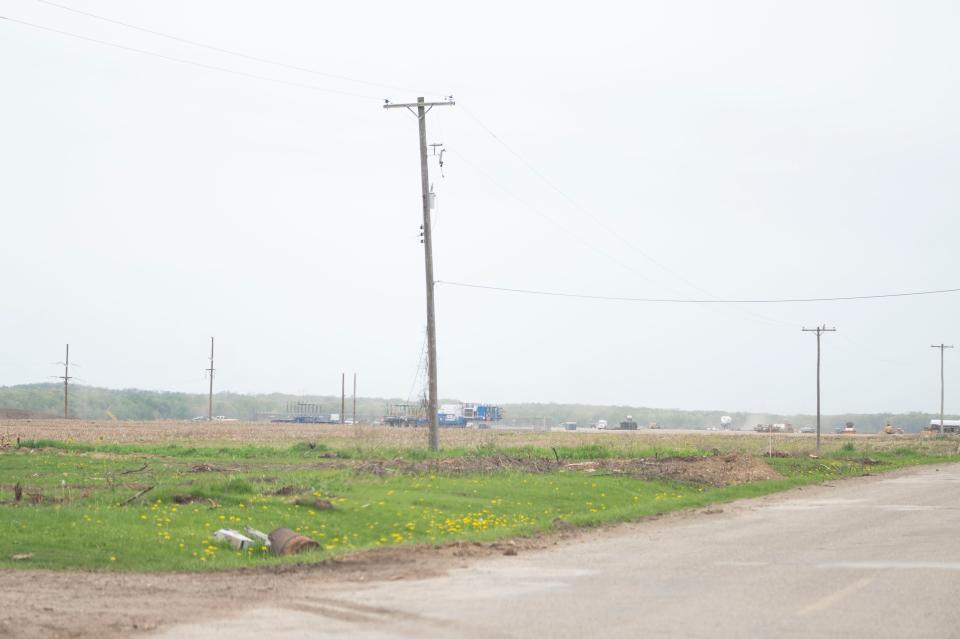
Durian, meanwhile, says the investment and jobs are needed.
Marshall has lost more than 2,000 jobs over the past two decades with the departure of State Farm, Eaton and others. The area's population, meanwhile, has been relatively idle, dropping slightly from 7,459 residents in 2000 to 6,822 in 2020, according to the U.S. Census.
"(These) 2,500 jobs replaces 2,000 jobs that were lost and adds additional jobs, and these are going to be high-paying manufacturing jobs," Durian said. "That will mean more customers for the downtown. There will be more tax dollars for the schools, more investment in infrastructure."
The project has received considerable incentives from the state, including $630 million from a supplemental spending bill for site prep work, a 15-year Renaissance Zone tax break valued at $772 million and $210 million in Critical Industry Program Funds (SOAR).
In total, MAEDA has received $750 million for land acquisition and site prep, $300 million of which will go directly to the Michigan Department of Transportation for road improvements that will benefit the Marshall site and beyond to facilitate traffic flow and safety.
"We’re encouraged to see the continued progress of this once-in-a-lifetime investment in Marshall that will further position Michigan at the heart of the global shift to EVs while delivering transformational opportunities to the Marshall community," Quentin L. Messer Jr., CEO of the Michigan Economic Development Corporation, said in a statement. "Projects like the BlueOval Battery Park will support generations of Michiganders with good-paying jobs and economic opportunities, while providing even more revenue for the city of Marshall and the surrounding region, including Battle Creek, to support greater funding for schools, fire and police departments. We look forward to watching this historic opportunity come to fruition and bring prosperity and growth to the region for years to come."
Contact reporter Greyson Steele at gsteele@battlecreekenquirer.com
This article originally appeared on Battle Creek Enquirer: Rezoning approved for Ford's EV battery plant in Marshall. So what's next?

